Contract Law: Analyzing Offer, Acceptance, and Exclusion Clauses
VerifiedAdded on 2023/06/10
|8
|3312
|97
Homework Assignment
AI Summary
This contract law assignment is divided into two parts. Part 1 examines the formation of a contract through offer and acceptance, specifically analyzing a scenario involving letters exchanged between two parties and the concept of a counter-offer. The analysis references legal principles and case laws like Hyde v Wrench and Holland v. Eyre to determine if a valid contract was formed. Part 2 explores exclusion clauses and their enforceability, addressing whether a company can use an exclusion clause printed on a towing machine to limit its liability. This section discusses the legal requirements for valid exclusion clauses, including their incorporation into the contract and interpretation, with an emphasis on bringing the clause to the other party's attention before the contract is signed. The assignment concludes that no valid contract existed in the first scenario due to the counter-offer and that the enforceability of the exclusion clause would depend on its proper incorporation and communication to the other party.
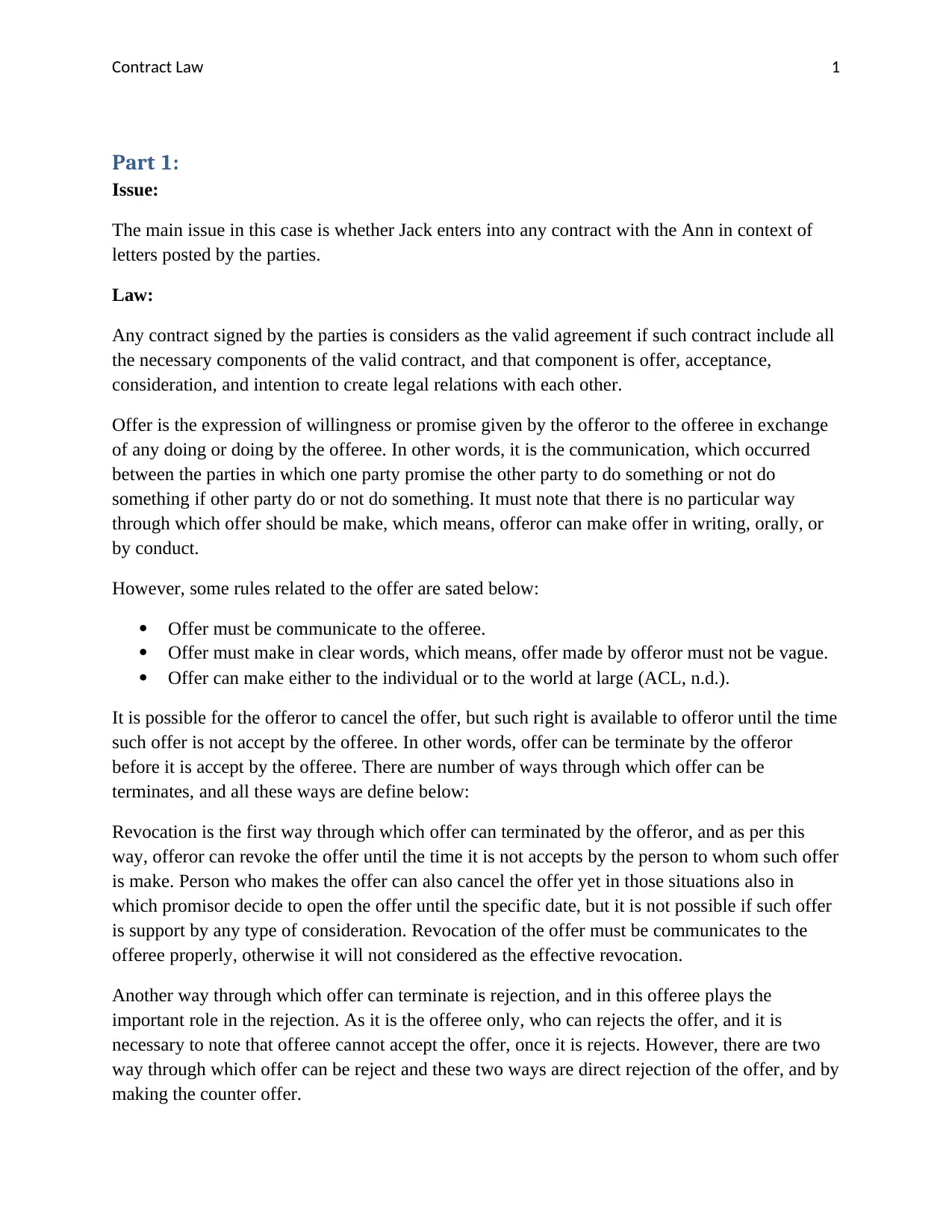
Contract Law 1
Part 1:
Issue:
The main issue in this case is whether Jack enters into any contract with the Ann in context of
letters posted by the parties.
Law:
Any contract signed by the parties is considers as the valid agreement if such contract include all
the necessary components of the valid contract, and that component is offer, acceptance,
consideration, and intention to create legal relations with each other.
Offer is the expression of willingness or promise given by the offeror to the offeree in exchange
of any doing or doing by the offeree. In other words, it is the communication, which occurred
between the parties in which one party promise the other party to do something or not do
something if other party do or not do something. It must note that there is no particular way
through which offer should be make, which means, offeror can make offer in writing, orally, or
by conduct.
However, some rules related to the offer are sated below:
Offer must be communicate to the offeree.
Offer must make in clear words, which means, offer made by offeror must not be vague.
Offer can make either to the individual or to the world at large (ACL, n.d.).
It is possible for the offeror to cancel the offer, but such right is available to offeror until the time
such offer is not accept by the offeree. In other words, offer can be terminate by the offeror
before it is accept by the offeree. There are number of ways through which offer can be
terminates, and all these ways are define below:
Revocation is the first way through which offer can terminated by the offeror, and as per this
way, offeror can revoke the offer until the time it is not accepts by the person to whom such offer
is make. Person who makes the offer can also cancel the offer yet in those situations also in
which promisor decide to open the offer until the specific date, but it is not possible if such offer
is support by any type of consideration. Revocation of the offer must be communicates to the
offeree properly, otherwise it will not considered as the effective revocation.
Another way through which offer can terminate is rejection, and in this offeree plays the
important role in the rejection. As it is the offeree only, who can rejects the offer, and it is
necessary to note that offeree cannot accept the offer, once it is rejects. However, there are two
way through which offer can be reject and these two ways are direct rejection of the offer, and by
making the counter offer.
Part 1:
Issue:
The main issue in this case is whether Jack enters into any contract with the Ann in context of
letters posted by the parties.
Law:
Any contract signed by the parties is considers as the valid agreement if such contract include all
the necessary components of the valid contract, and that component is offer, acceptance,
consideration, and intention to create legal relations with each other.
Offer is the expression of willingness or promise given by the offeror to the offeree in exchange
of any doing or doing by the offeree. In other words, it is the communication, which occurred
between the parties in which one party promise the other party to do something or not do
something if other party do or not do something. It must note that there is no particular way
through which offer should be make, which means, offeror can make offer in writing, orally, or
by conduct.
However, some rules related to the offer are sated below:
Offer must be communicate to the offeree.
Offer must make in clear words, which means, offer made by offeror must not be vague.
Offer can make either to the individual or to the world at large (ACL, n.d.).
It is possible for the offeror to cancel the offer, but such right is available to offeror until the time
such offer is not accept by the offeree. In other words, offer can be terminate by the offeror
before it is accept by the offeree. There are number of ways through which offer can be
terminates, and all these ways are define below:
Revocation is the first way through which offer can terminated by the offeror, and as per this
way, offeror can revoke the offer until the time it is not accepts by the person to whom such offer
is make. Person who makes the offer can also cancel the offer yet in those situations also in
which promisor decide to open the offer until the specific date, but it is not possible if such offer
is support by any type of consideration. Revocation of the offer must be communicates to the
offeree properly, otherwise it will not considered as the effective revocation.
Another way through which offer can terminate is rejection, and in this offeree plays the
important role in the rejection. As it is the offeree only, who can rejects the offer, and it is
necessary to note that offeree cannot accept the offer, once it is rejects. However, there are two
way through which offer can be reject and these two ways are direct rejection of the offer, and by
making the counter offer.
Paraphrase This Document
Need a fresh take? Get an instant paraphrase of this document with our AI Paraphraser
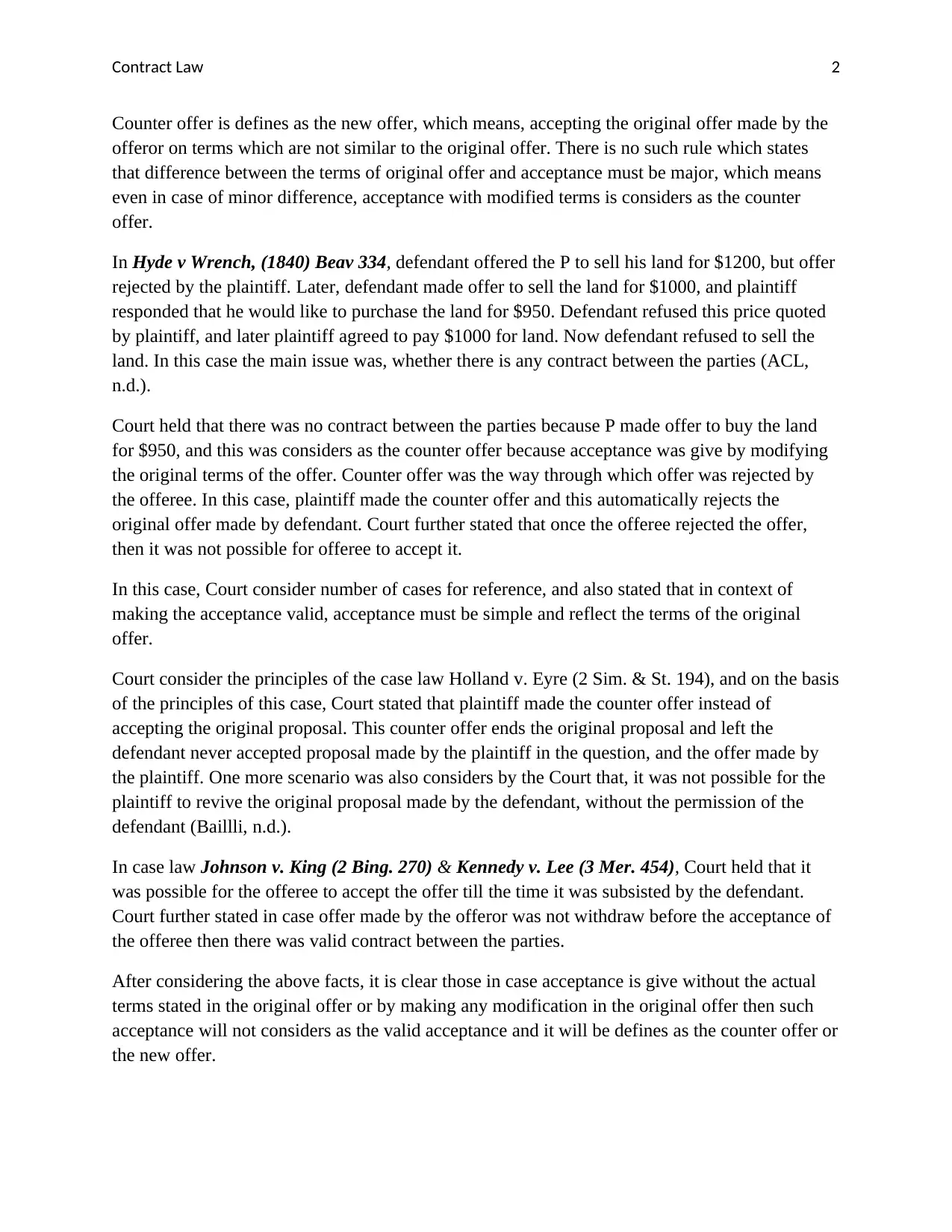
Contract Law 2
Counter offer is defines as the new offer, which means, accepting the original offer made by the
offeror on terms which are not similar to the original offer. There is no such rule which states
that difference between the terms of original offer and acceptance must be major, which means
even in case of minor difference, acceptance with modified terms is considers as the counter
offer.
In Hyde v Wrench, (1840) Beav 334, defendant offered the P to sell his land for $1200, but offer
rejected by the plaintiff. Later, defendant made offer to sell the land for $1000, and plaintiff
responded that he would like to purchase the land for $950. Defendant refused this price quoted
by plaintiff, and later plaintiff agreed to pay $1000 for land. Now defendant refused to sell the
land. In this case the main issue was, whether there is any contract between the parties (ACL,
n.d.).
Court held that there was no contract between the parties because P made offer to buy the land
for $950, and this was considers as the counter offer because acceptance was give by modifying
the original terms of the offer. Counter offer was the way through which offer was rejected by
the offeree. In this case, plaintiff made the counter offer and this automatically rejects the
original offer made by defendant. Court further stated that once the offeree rejected the offer,
then it was not possible for offeree to accept it.
In this case, Court consider number of cases for reference, and also stated that in context of
making the acceptance valid, acceptance must be simple and reflect the terms of the original
offer.
Court consider the principles of the case law Holland v. Eyre (2 Sim. & St. 194), and on the basis
of the principles of this case, Court stated that plaintiff made the counter offer instead of
accepting the original proposal. This counter offer ends the original proposal and left the
defendant never accepted proposal made by the plaintiff in the question, and the offer made by
the plaintiff. One more scenario was also considers by the Court that, it was not possible for the
plaintiff to revive the original proposal made by the defendant, without the permission of the
defendant (Baillli, n.d.).
In case law Johnson v. King (2 Bing. 270) & Kennedy v. Lee (3 Mer. 454), Court held that it
was possible for the offeree to accept the offer till the time it was subsisted by the defendant.
Court further stated in case offer made by the offeror was not withdraw before the acceptance of
the offeree then there was valid contract between the parties.
After considering the above facts, it is clear those in case acceptance is give without the actual
terms stated in the original offer or by making any modification in the original offer then such
acceptance will not considers as the valid acceptance and it will be defines as the counter offer or
the new offer.
Counter offer is defines as the new offer, which means, accepting the original offer made by the
offeror on terms which are not similar to the original offer. There is no such rule which states
that difference between the terms of original offer and acceptance must be major, which means
even in case of minor difference, acceptance with modified terms is considers as the counter
offer.
In Hyde v Wrench, (1840) Beav 334, defendant offered the P to sell his land for $1200, but offer
rejected by the plaintiff. Later, defendant made offer to sell the land for $1000, and plaintiff
responded that he would like to purchase the land for $950. Defendant refused this price quoted
by plaintiff, and later plaintiff agreed to pay $1000 for land. Now defendant refused to sell the
land. In this case the main issue was, whether there is any contract between the parties (ACL,
n.d.).
Court held that there was no contract between the parties because P made offer to buy the land
for $950, and this was considers as the counter offer because acceptance was give by modifying
the original terms of the offer. Counter offer was the way through which offer was rejected by
the offeree. In this case, plaintiff made the counter offer and this automatically rejects the
original offer made by defendant. Court further stated that once the offeree rejected the offer,
then it was not possible for offeree to accept it.
In this case, Court consider number of cases for reference, and also stated that in context of
making the acceptance valid, acceptance must be simple and reflect the terms of the original
offer.
Court consider the principles of the case law Holland v. Eyre (2 Sim. & St. 194), and on the basis
of the principles of this case, Court stated that plaintiff made the counter offer instead of
accepting the original proposal. This counter offer ends the original proposal and left the
defendant never accepted proposal made by the plaintiff in the question, and the offer made by
the plaintiff. One more scenario was also considers by the Court that, it was not possible for the
plaintiff to revive the original proposal made by the defendant, without the permission of the
defendant (Baillli, n.d.).
In case law Johnson v. King (2 Bing. 270) & Kennedy v. Lee (3 Mer. 454), Court held that it
was possible for the offeree to accept the offer till the time it was subsisted by the defendant.
Court further stated in case offer made by the offeror was not withdraw before the acceptance of
the offeree then there was valid contract between the parties.
After considering the above facts, it is clear those in case acceptance is give without the actual
terms stated in the original offer or by making any modification in the original offer then such
acceptance will not considers as the valid acceptance and it will be defines as the counter offer or
the new offer.
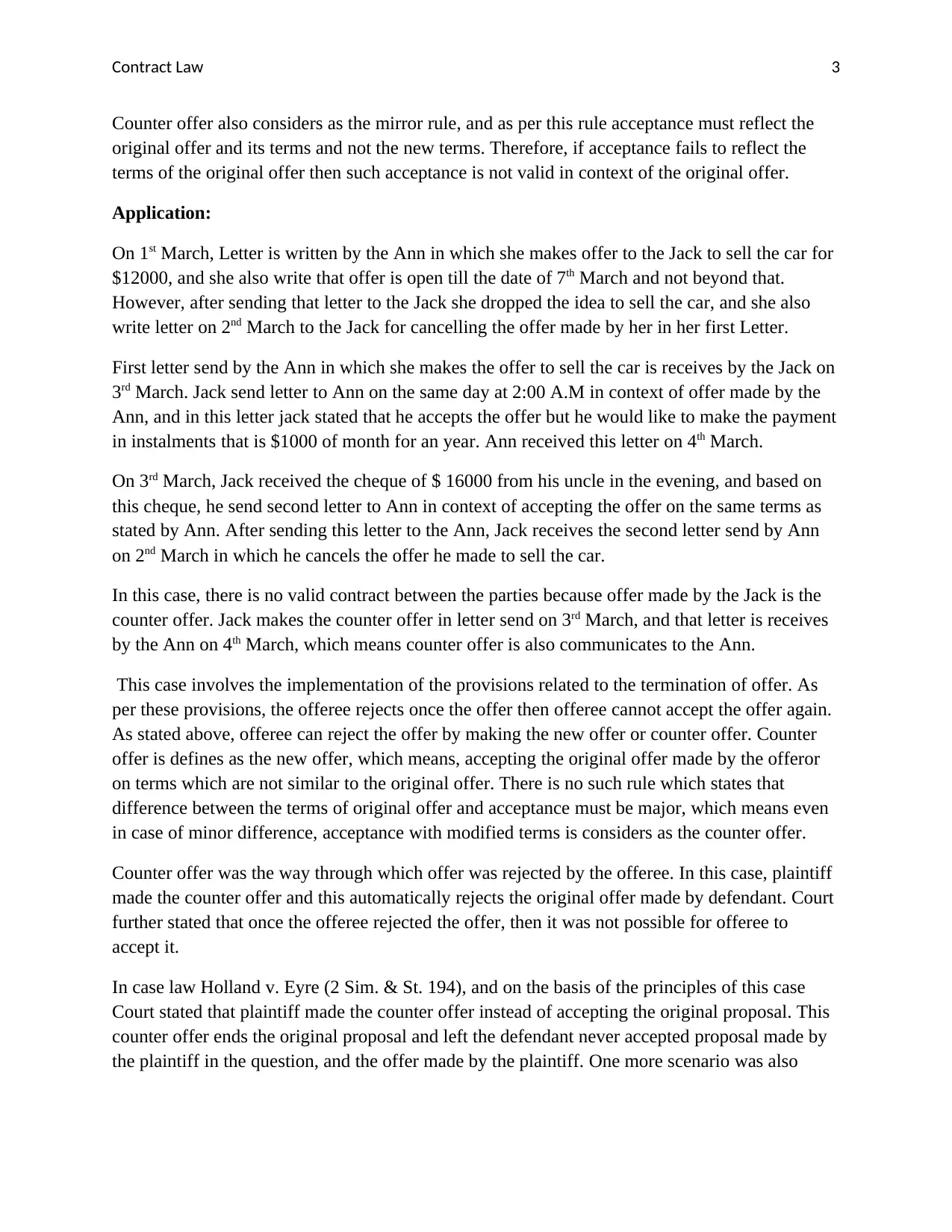
Contract Law 3
Counter offer also considers as the mirror rule, and as per this rule acceptance must reflect the
original offer and its terms and not the new terms. Therefore, if acceptance fails to reflect the
terms of the original offer then such acceptance is not valid in context of the original offer.
Application:
On 1st March, Letter is written by the Ann in which she makes offer to the Jack to sell the car for
$12000, and she also write that offer is open till the date of 7th March and not beyond that.
However, after sending that letter to the Jack she dropped the idea to sell the car, and she also
write letter on 2nd March to the Jack for cancelling the offer made by her in her first Letter.
First letter send by the Ann in which she makes the offer to sell the car is receives by the Jack on
3rd March. Jack send letter to Ann on the same day at 2:00 A.M in context of offer made by the
Ann, and in this letter jack stated that he accepts the offer but he would like to make the payment
in instalments that is $1000 of month for an year. Ann received this letter on 4th March.
On 3rd March, Jack received the cheque of $ 16000 from his uncle in the evening, and based on
this cheque, he send second letter to Ann in context of accepting the offer on the same terms as
stated by Ann. After sending this letter to the Ann, Jack receives the second letter send by Ann
on 2nd March in which he cancels the offer he made to sell the car.
In this case, there is no valid contract between the parties because offer made by the Jack is the
counter offer. Jack makes the counter offer in letter send on 3rd March, and that letter is receives
by the Ann on 4th March, which means counter offer is also communicates to the Ann.
This case involves the implementation of the provisions related to the termination of offer. As
per these provisions, the offeree rejects once the offer then offeree cannot accept the offer again.
As stated above, offeree can reject the offer by making the new offer or counter offer. Counter
offer is defines as the new offer, which means, accepting the original offer made by the offeror
on terms which are not similar to the original offer. There is no such rule which states that
difference between the terms of original offer and acceptance must be major, which means even
in case of minor difference, acceptance with modified terms is considers as the counter offer.
Counter offer was the way through which offer was rejected by the offeree. In this case, plaintiff
made the counter offer and this automatically rejects the original offer made by defendant. Court
further stated that once the offeree rejected the offer, then it was not possible for offeree to
accept it.
In case law Holland v. Eyre (2 Sim. & St. 194), and on the basis of the principles of this case
Court stated that plaintiff made the counter offer instead of accepting the original proposal. This
counter offer ends the original proposal and left the defendant never accepted proposal made by
the plaintiff in the question, and the offer made by the plaintiff. One more scenario was also
Counter offer also considers as the mirror rule, and as per this rule acceptance must reflect the
original offer and its terms and not the new terms. Therefore, if acceptance fails to reflect the
terms of the original offer then such acceptance is not valid in context of the original offer.
Application:
On 1st March, Letter is written by the Ann in which she makes offer to the Jack to sell the car for
$12000, and she also write that offer is open till the date of 7th March and not beyond that.
However, after sending that letter to the Jack she dropped the idea to sell the car, and she also
write letter on 2nd March to the Jack for cancelling the offer made by her in her first Letter.
First letter send by the Ann in which she makes the offer to sell the car is receives by the Jack on
3rd March. Jack send letter to Ann on the same day at 2:00 A.M in context of offer made by the
Ann, and in this letter jack stated that he accepts the offer but he would like to make the payment
in instalments that is $1000 of month for an year. Ann received this letter on 4th March.
On 3rd March, Jack received the cheque of $ 16000 from his uncle in the evening, and based on
this cheque, he send second letter to Ann in context of accepting the offer on the same terms as
stated by Ann. After sending this letter to the Ann, Jack receives the second letter send by Ann
on 2nd March in which he cancels the offer he made to sell the car.
In this case, there is no valid contract between the parties because offer made by the Jack is the
counter offer. Jack makes the counter offer in letter send on 3rd March, and that letter is receives
by the Ann on 4th March, which means counter offer is also communicates to the Ann.
This case involves the implementation of the provisions related to the termination of offer. As
per these provisions, the offeree rejects once the offer then offeree cannot accept the offer again.
As stated above, offeree can reject the offer by making the new offer or counter offer. Counter
offer is defines as the new offer, which means, accepting the original offer made by the offeror
on terms which are not similar to the original offer. There is no such rule which states that
difference between the terms of original offer and acceptance must be major, which means even
in case of minor difference, acceptance with modified terms is considers as the counter offer.
Counter offer was the way through which offer was rejected by the offeree. In this case, plaintiff
made the counter offer and this automatically rejects the original offer made by defendant. Court
further stated that once the offeree rejected the offer, then it was not possible for offeree to
accept it.
In case law Holland v. Eyre (2 Sim. & St. 194), and on the basis of the principles of this case
Court stated that plaintiff made the counter offer instead of accepting the original proposal. This
counter offer ends the original proposal and left the defendant never accepted proposal made by
the plaintiff in the question, and the offer made by the plaintiff. One more scenario was also
⊘ This is a preview!⊘
Do you want full access?
Subscribe today to unlock all pages.

Trusted by 1+ million students worldwide
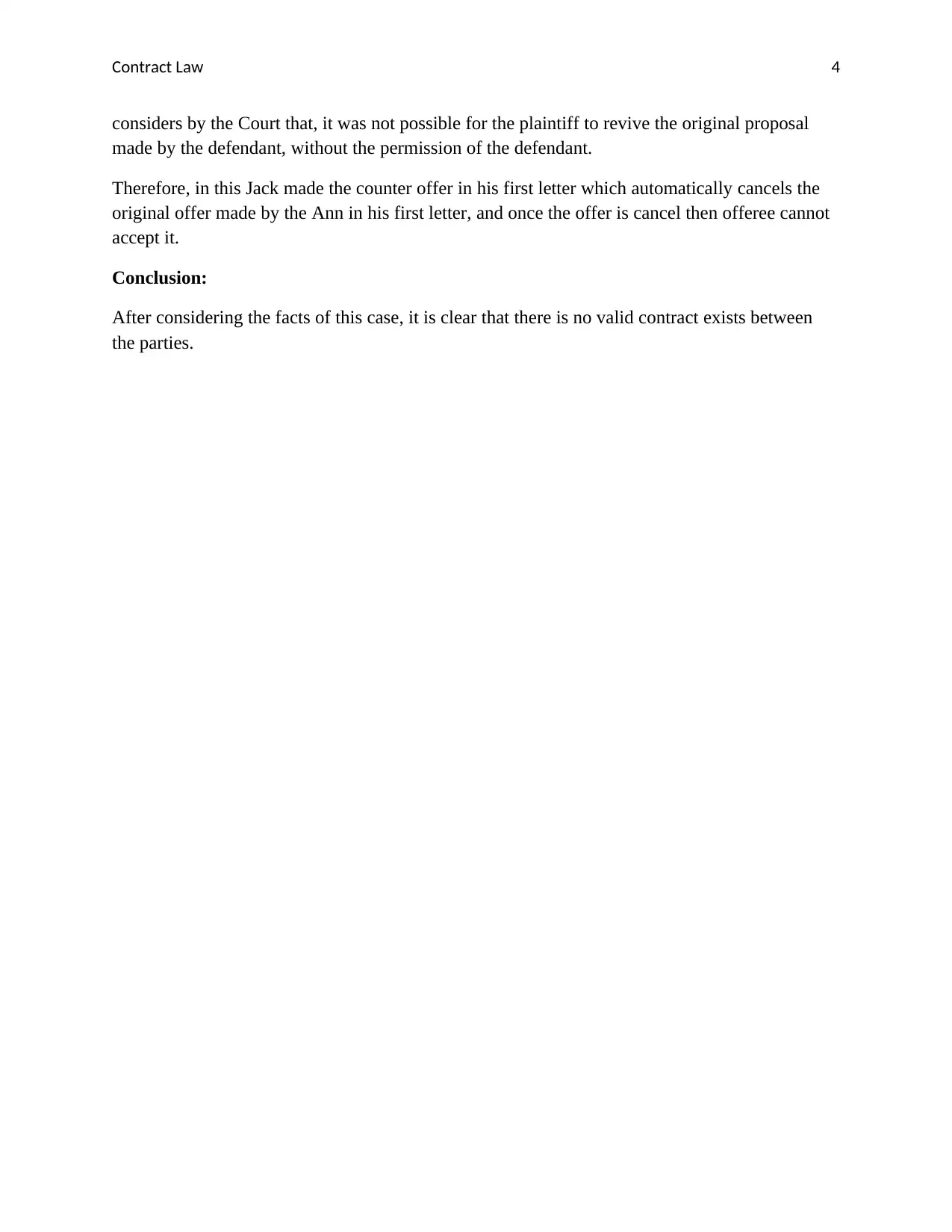
Contract Law 4
considers by the Court that, it was not possible for the plaintiff to revive the original proposal
made by the defendant, without the permission of the defendant.
Therefore, in this Jack made the counter offer in his first letter which automatically cancels the
original offer made by the Ann in his first letter, and once the offer is cancel then offeree cannot
accept it.
Conclusion:
After considering the facts of this case, it is clear that there is no valid contract exists between
the parties.
considers by the Court that, it was not possible for the plaintiff to revive the original proposal
made by the defendant, without the permission of the defendant.
Therefore, in this Jack made the counter offer in his first letter which automatically cancels the
original offer made by the Ann in his first letter, and once the offer is cancel then offeree cannot
accept it.
Conclusion:
After considering the facts of this case, it is clear that there is no valid contract exists between
the parties.
Paraphrase This Document
Need a fresh take? Get an instant paraphrase of this document with our AI Paraphraser
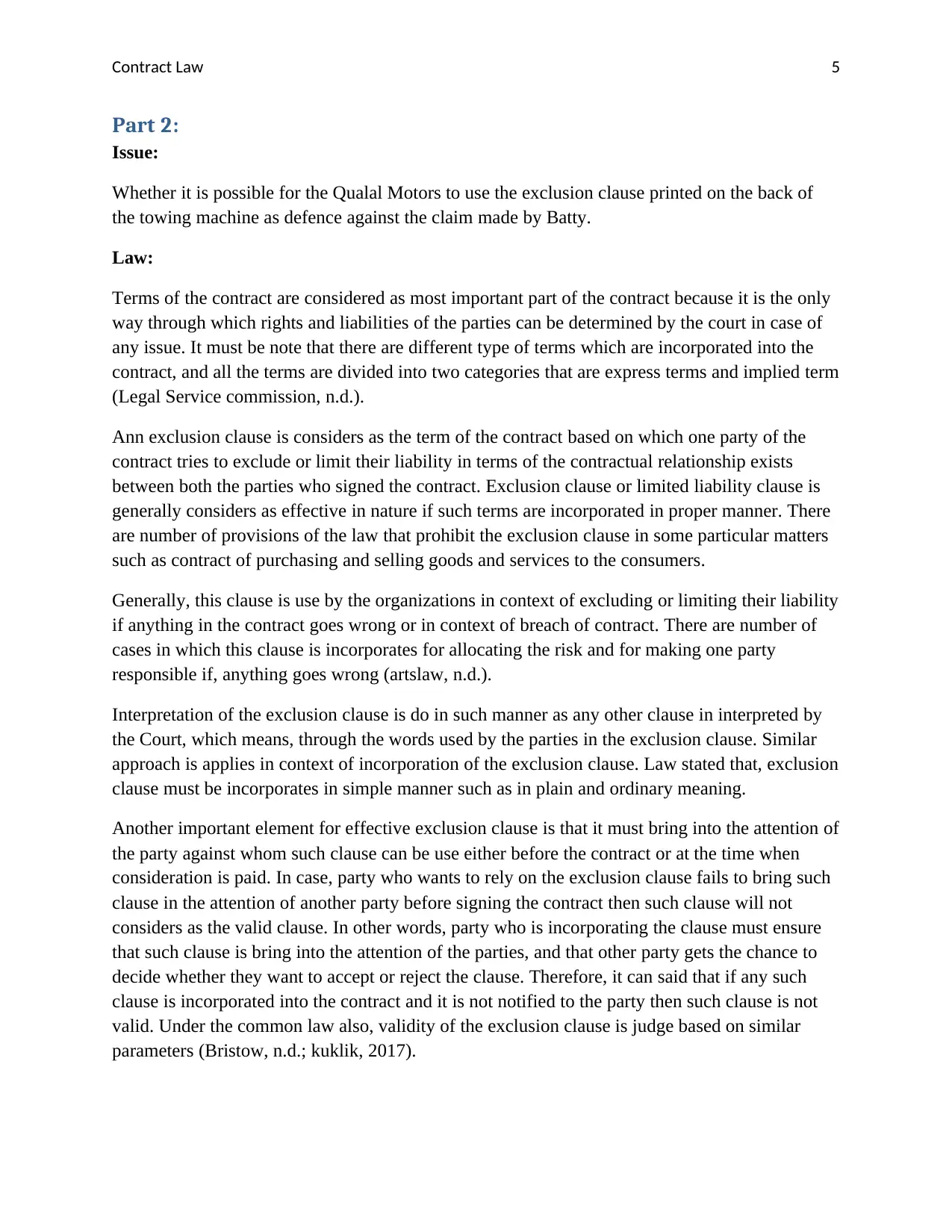
Contract Law 5
Part 2:
Issue:
Whether it is possible for the Qualal Motors to use the exclusion clause printed on the back of
the towing machine as defence against the claim made by Batty.
Law:
Terms of the contract are considered as most important part of the contract because it is the only
way through which rights and liabilities of the parties can be determined by the court in case of
any issue. It must be note that there are different type of terms which are incorporated into the
contract, and all the terms are divided into two categories that are express terms and implied term
(Legal Service commission, n.d.).
Ann exclusion clause is considers as the term of the contract based on which one party of the
contract tries to exclude or limit their liability in terms of the contractual relationship exists
between both the parties who signed the contract. Exclusion clause or limited liability clause is
generally considers as effective in nature if such terms are incorporated in proper manner. There
are number of provisions of the law that prohibit the exclusion clause in some particular matters
such as contract of purchasing and selling goods and services to the consumers.
Generally, this clause is use by the organizations in context of excluding or limiting their liability
if anything in the contract goes wrong or in context of breach of contract. There are number of
cases in which this clause is incorporates for allocating the risk and for making one party
responsible if, anything goes wrong (artslaw, n.d.).
Interpretation of the exclusion clause is do in such manner as any other clause in interpreted by
the Court, which means, through the words used by the parties in the exclusion clause. Similar
approach is applies in context of incorporation of the exclusion clause. Law stated that, exclusion
clause must be incorporates in simple manner such as in plain and ordinary meaning.
Another important element for effective exclusion clause is that it must bring into the attention of
the party against whom such clause can be use either before the contract or at the time when
consideration is paid. In case, party who wants to rely on the exclusion clause fails to bring such
clause in the attention of another party before signing the contract then such clause will not
considers as the valid clause. In other words, party who is incorporating the clause must ensure
that such clause is bring into the attention of the parties, and that other party gets the chance to
decide whether they want to accept or reject the clause. Therefore, it can said that if any such
clause is incorporated into the contract and it is not notified to the party then such clause is not
valid. Under the common law also, validity of the exclusion clause is judge based on similar
parameters (Bristow, n.d.; kuklik, 2017).
Part 2:
Issue:
Whether it is possible for the Qualal Motors to use the exclusion clause printed on the back of
the towing machine as defence against the claim made by Batty.
Law:
Terms of the contract are considered as most important part of the contract because it is the only
way through which rights and liabilities of the parties can be determined by the court in case of
any issue. It must be note that there are different type of terms which are incorporated into the
contract, and all the terms are divided into two categories that are express terms and implied term
(Legal Service commission, n.d.).
Ann exclusion clause is considers as the term of the contract based on which one party of the
contract tries to exclude or limit their liability in terms of the contractual relationship exists
between both the parties who signed the contract. Exclusion clause or limited liability clause is
generally considers as effective in nature if such terms are incorporated in proper manner. There
are number of provisions of the law that prohibit the exclusion clause in some particular matters
such as contract of purchasing and selling goods and services to the consumers.
Generally, this clause is use by the organizations in context of excluding or limiting their liability
if anything in the contract goes wrong or in context of breach of contract. There are number of
cases in which this clause is incorporates for allocating the risk and for making one party
responsible if, anything goes wrong (artslaw, n.d.).
Interpretation of the exclusion clause is do in such manner as any other clause in interpreted by
the Court, which means, through the words used by the parties in the exclusion clause. Similar
approach is applies in context of incorporation of the exclusion clause. Law stated that, exclusion
clause must be incorporates in simple manner such as in plain and ordinary meaning.
Another important element for effective exclusion clause is that it must bring into the attention of
the party against whom such clause can be use either before the contract or at the time when
consideration is paid. In case, party who wants to rely on the exclusion clause fails to bring such
clause in the attention of another party before signing the contract then such clause will not
considers as the valid clause. In other words, party who is incorporating the clause must ensure
that such clause is bring into the attention of the parties, and that other party gets the chance to
decide whether they want to accept or reject the clause. Therefore, it can said that if any such
clause is incorporated into the contract and it is not notified to the party then such clause is not
valid. Under the common law also, validity of the exclusion clause is judge based on similar
parameters (Bristow, n.d.; kuklik, 2017).
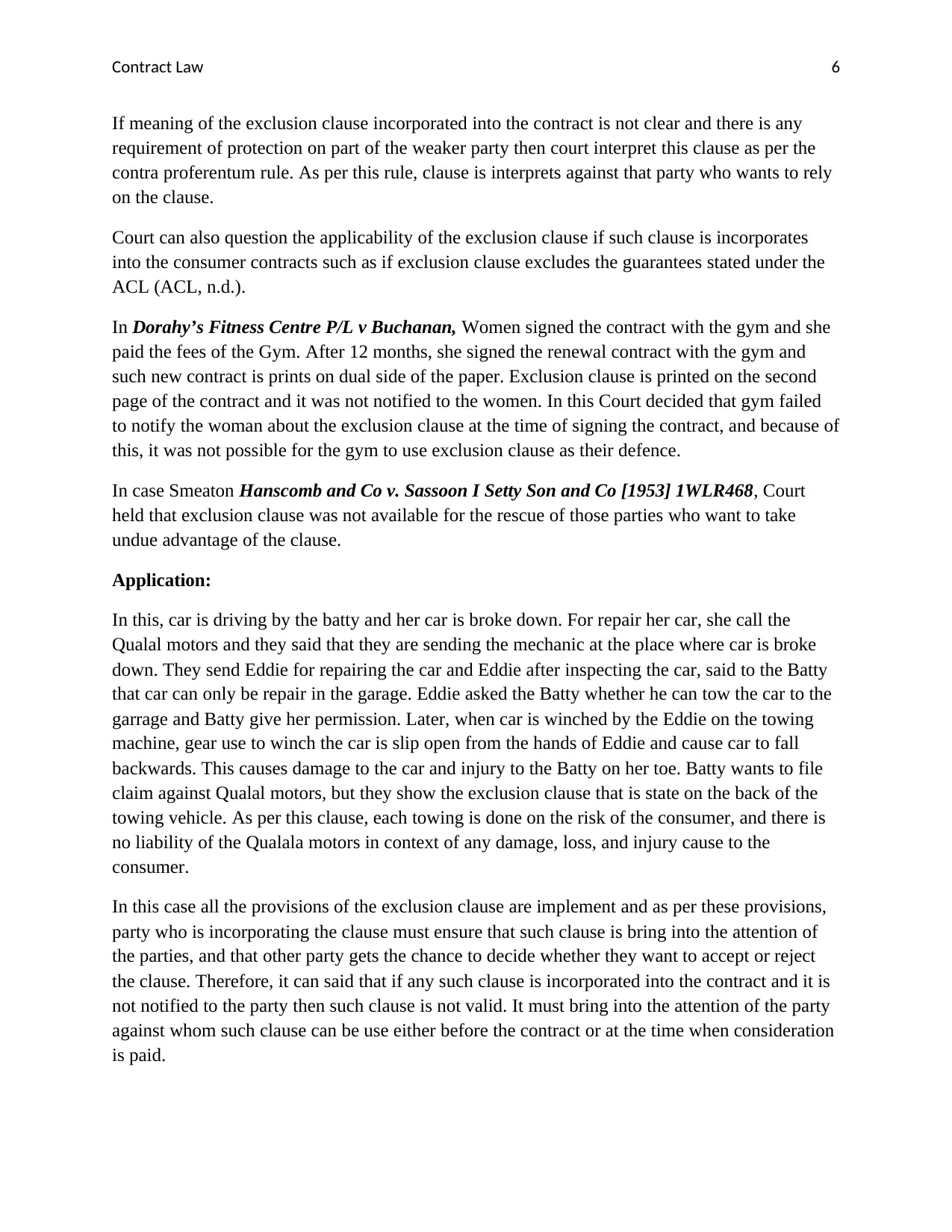
Contract Law 6
If meaning of the exclusion clause incorporated into the contract is not clear and there is any
requirement of protection on part of the weaker party then court interpret this clause as per the
contra proferentum rule. As per this rule, clause is interprets against that party who wants to rely
on the clause.
Court can also question the applicability of the exclusion clause if such clause is incorporates
into the consumer contracts such as if exclusion clause excludes the guarantees stated under the
ACL (ACL, n.d.).
In Dorahy’s Fitness Centre P/L v Buchanan, Women signed the contract with the gym and she
paid the fees of the Gym. After 12 months, she signed the renewal contract with the gym and
such new contract is prints on dual side of the paper. Exclusion clause is printed on the second
page of the contract and it was not notified to the women. In this Court decided that gym failed
to notify the woman about the exclusion clause at the time of signing the contract, and because of
this, it was not possible for the gym to use exclusion clause as their defence.
In case Smeaton Hanscomb and Co v. Sassoon I Setty Son and Co [1953] 1WLR468, Court
held that exclusion clause was not available for the rescue of those parties who want to take
undue advantage of the clause.
Application:
In this, car is driving by the batty and her car is broke down. For repair her car, she call the
Qualal motors and they said that they are sending the mechanic at the place where car is broke
down. They send Eddie for repairing the car and Eddie after inspecting the car, said to the Batty
that car can only be repair in the garage. Eddie asked the Batty whether he can tow the car to the
garrage and Batty give her permission. Later, when car is winched by the Eddie on the towing
machine, gear use to winch the car is slip open from the hands of Eddie and cause car to fall
backwards. This causes damage to the car and injury to the Batty on her toe. Batty wants to file
claim against Qualal motors, but they show the exclusion clause that is state on the back of the
towing vehicle. As per this clause, each towing is done on the risk of the consumer, and there is
no liability of the Qualala motors in context of any damage, loss, and injury cause to the
consumer.
In this case all the provisions of the exclusion clause are implement and as per these provisions,
party who is incorporating the clause must ensure that such clause is bring into the attention of
the parties, and that other party gets the chance to decide whether they want to accept or reject
the clause. Therefore, it can said that if any such clause is incorporated into the contract and it is
not notified to the party then such clause is not valid. It must bring into the attention of the party
against whom such clause can be use either before the contract or at the time when consideration
is paid.
If meaning of the exclusion clause incorporated into the contract is not clear and there is any
requirement of protection on part of the weaker party then court interpret this clause as per the
contra proferentum rule. As per this rule, clause is interprets against that party who wants to rely
on the clause.
Court can also question the applicability of the exclusion clause if such clause is incorporates
into the consumer contracts such as if exclusion clause excludes the guarantees stated under the
ACL (ACL, n.d.).
In Dorahy’s Fitness Centre P/L v Buchanan, Women signed the contract with the gym and she
paid the fees of the Gym. After 12 months, she signed the renewal contract with the gym and
such new contract is prints on dual side of the paper. Exclusion clause is printed on the second
page of the contract and it was not notified to the women. In this Court decided that gym failed
to notify the woman about the exclusion clause at the time of signing the contract, and because of
this, it was not possible for the gym to use exclusion clause as their defence.
In case Smeaton Hanscomb and Co v. Sassoon I Setty Son and Co [1953] 1WLR468, Court
held that exclusion clause was not available for the rescue of those parties who want to take
undue advantage of the clause.
Application:
In this, car is driving by the batty and her car is broke down. For repair her car, she call the
Qualal motors and they said that they are sending the mechanic at the place where car is broke
down. They send Eddie for repairing the car and Eddie after inspecting the car, said to the Batty
that car can only be repair in the garage. Eddie asked the Batty whether he can tow the car to the
garrage and Batty give her permission. Later, when car is winched by the Eddie on the towing
machine, gear use to winch the car is slip open from the hands of Eddie and cause car to fall
backwards. This causes damage to the car and injury to the Batty on her toe. Batty wants to file
claim against Qualal motors, but they show the exclusion clause that is state on the back of the
towing vehicle. As per this clause, each towing is done on the risk of the consumer, and there is
no liability of the Qualala motors in context of any damage, loss, and injury cause to the
consumer.
In this case all the provisions of the exclusion clause are implement and as per these provisions,
party who is incorporating the clause must ensure that such clause is bring into the attention of
the parties, and that other party gets the chance to decide whether they want to accept or reject
the clause. Therefore, it can said that if any such clause is incorporated into the contract and it is
not notified to the party then such clause is not valid. It must bring into the attention of the party
against whom such clause can be use either before the contract or at the time when consideration
is paid.
⊘ This is a preview!⊘
Do you want full access?
Subscribe today to unlock all pages.

Trusted by 1+ million students worldwide
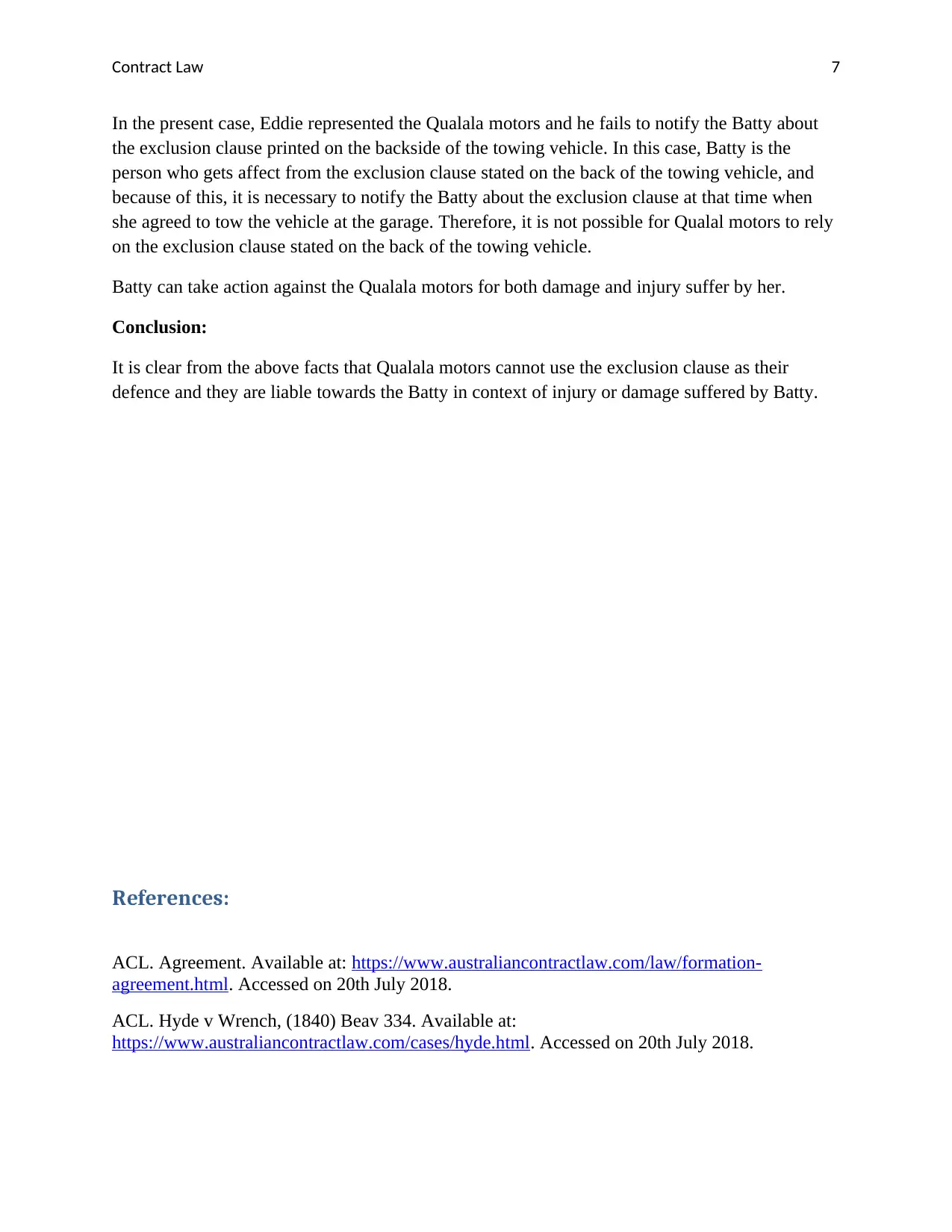
Contract Law 7
In the present case, Eddie represented the Qualala motors and he fails to notify the Batty about
the exclusion clause printed on the backside of the towing vehicle. In this case, Batty is the
person who gets affect from the exclusion clause stated on the back of the towing vehicle, and
because of this, it is necessary to notify the Batty about the exclusion clause at that time when
she agreed to tow the vehicle at the garage. Therefore, it is not possible for Qualal motors to rely
on the exclusion clause stated on the back of the towing vehicle.
Batty can take action against the Qualala motors for both damage and injury suffer by her.
Conclusion:
It is clear from the above facts that Qualala motors cannot use the exclusion clause as their
defence and they are liable towards the Batty in context of injury or damage suffered by Batty.
References:
ACL. Agreement. Available at: https://www.australiancontractlaw.com/law/formation-
agreement.html. Accessed on 20th July 2018.
ACL. Hyde v Wrench, (1840) Beav 334. Available at:
https://www.australiancontractlaw.com/cases/hyde.html. Accessed on 20th July 2018.
In the present case, Eddie represented the Qualala motors and he fails to notify the Batty about
the exclusion clause printed on the backside of the towing vehicle. In this case, Batty is the
person who gets affect from the exclusion clause stated on the back of the towing vehicle, and
because of this, it is necessary to notify the Batty about the exclusion clause at that time when
she agreed to tow the vehicle at the garage. Therefore, it is not possible for Qualal motors to rely
on the exclusion clause stated on the back of the towing vehicle.
Batty can take action against the Qualala motors for both damage and injury suffer by her.
Conclusion:
It is clear from the above facts that Qualala motors cannot use the exclusion clause as their
defence and they are liable towards the Batty in context of injury or damage suffered by Batty.
References:
ACL. Agreement. Available at: https://www.australiancontractlaw.com/law/formation-
agreement.html. Accessed on 20th July 2018.
ACL. Hyde v Wrench, (1840) Beav 334. Available at:
https://www.australiancontractlaw.com/cases/hyde.html. Accessed on 20th July 2018.
Paraphrase This Document
Need a fresh take? Get an instant paraphrase of this document with our AI Paraphraser
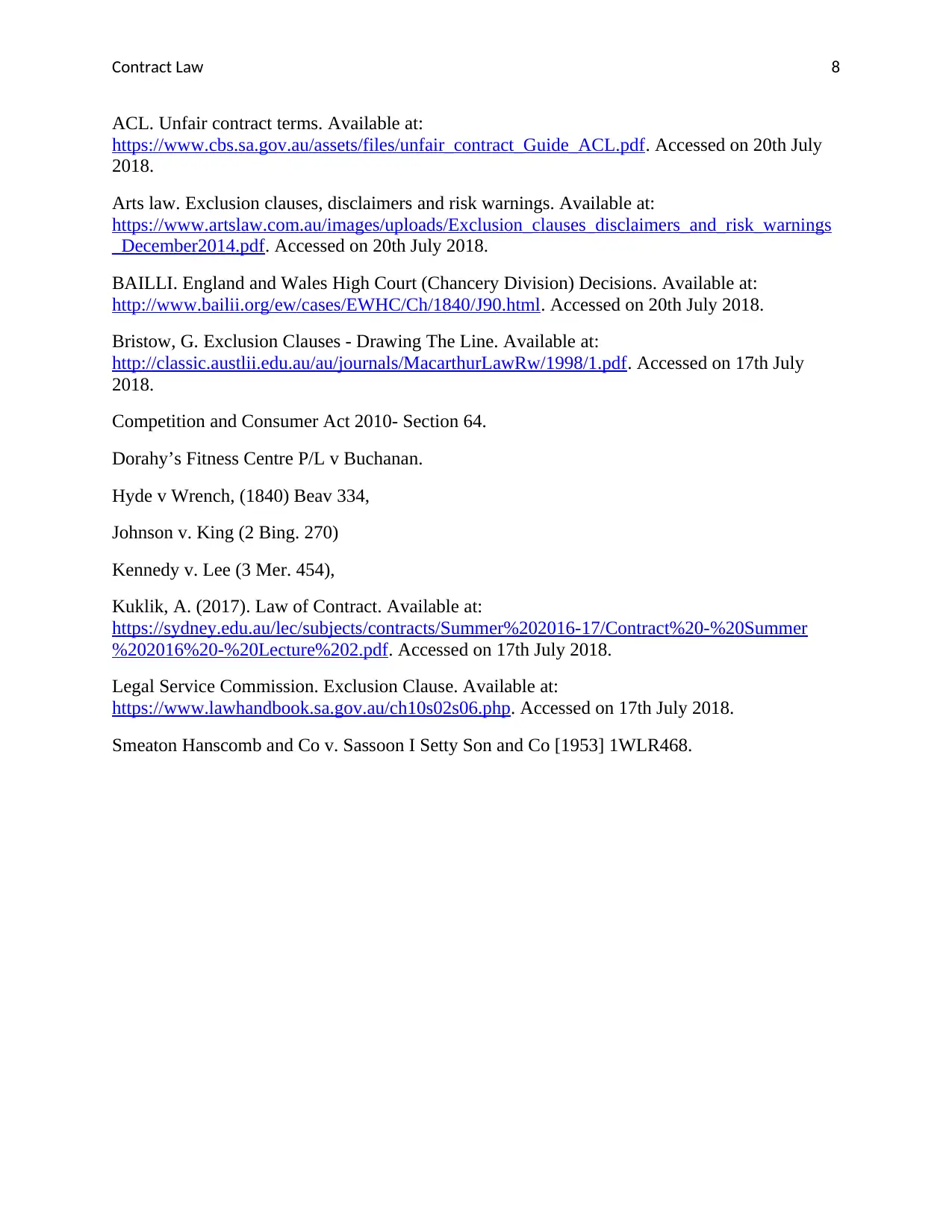
Contract Law 8
ACL. Unfair contract terms. Available at:
https://www.cbs.sa.gov.au/assets/files/unfair_contract_Guide_ACL.pdf. Accessed on 20th July
2018.
Arts law. Exclusion clauses, disclaimers and risk warnings. Available at:
https://www.artslaw.com.au/images/uploads/Exclusion_clauses_disclaimers_and_risk_warnings
_December2014.pdf. Accessed on 20th July 2018.
BAILLI. England and Wales High Court (Chancery Division) Decisions. Available at:
http://www.bailii.org/ew/cases/EWHC/Ch/1840/J90.html. Accessed on 20th July 2018.
Bristow, G. Exclusion Clauses - Drawing The Line. Available at:
http://classic.austlii.edu.au/au/journals/MacarthurLawRw/1998/1.pdf. Accessed on 17th July
2018.
Competition and Consumer Act 2010- Section 64.
Dorahy’s Fitness Centre P/L v Buchanan.
Hyde v Wrench, (1840) Beav 334,
Johnson v. King (2 Bing. 270)
Kennedy v. Lee (3 Mer. 454),
Kuklik, A. (2017). Law of Contract. Available at:
https://sydney.edu.au/lec/subjects/contracts/Summer%202016-17/Contract%20-%20Summer
%202016%20-%20Lecture%202.pdf. Accessed on 17th July 2018.
Legal Service Commission. Exclusion Clause. Available at:
https://www.lawhandbook.sa.gov.au/ch10s02s06.php. Accessed on 17th July 2018.
Smeaton Hanscomb and Co v. Sassoon I Setty Son and Co [1953] 1WLR468.
ACL. Unfair contract terms. Available at:
https://www.cbs.sa.gov.au/assets/files/unfair_contract_Guide_ACL.pdf. Accessed on 20th July
2018.
Arts law. Exclusion clauses, disclaimers and risk warnings. Available at:
https://www.artslaw.com.au/images/uploads/Exclusion_clauses_disclaimers_and_risk_warnings
_December2014.pdf. Accessed on 20th July 2018.
BAILLI. England and Wales High Court (Chancery Division) Decisions. Available at:
http://www.bailii.org/ew/cases/EWHC/Ch/1840/J90.html. Accessed on 20th July 2018.
Bristow, G. Exclusion Clauses - Drawing The Line. Available at:
http://classic.austlii.edu.au/au/journals/MacarthurLawRw/1998/1.pdf. Accessed on 17th July
2018.
Competition and Consumer Act 2010- Section 64.
Dorahy’s Fitness Centre P/L v Buchanan.
Hyde v Wrench, (1840) Beav 334,
Johnson v. King (2 Bing. 270)
Kennedy v. Lee (3 Mer. 454),
Kuklik, A. (2017). Law of Contract. Available at:
https://sydney.edu.au/lec/subjects/contracts/Summer%202016-17/Contract%20-%20Summer
%202016%20-%20Lecture%202.pdf. Accessed on 17th July 2018.
Legal Service Commission. Exclusion Clause. Available at:
https://www.lawhandbook.sa.gov.au/ch10s02s06.php. Accessed on 17th July 2018.
Smeaton Hanscomb and Co v. Sassoon I Setty Son and Co [1953] 1WLR468.
1 out of 8
Related Documents
Your All-in-One AI-Powered Toolkit for Academic Success.
+13062052269
info@desklib.com
Available 24*7 on WhatsApp / Email
![[object Object]](/_next/static/media/star-bottom.7253800d.svg)
Unlock your academic potential
Copyright © 2020–2026 A2Z Services. All Rights Reserved. Developed and managed by ZUCOL.




